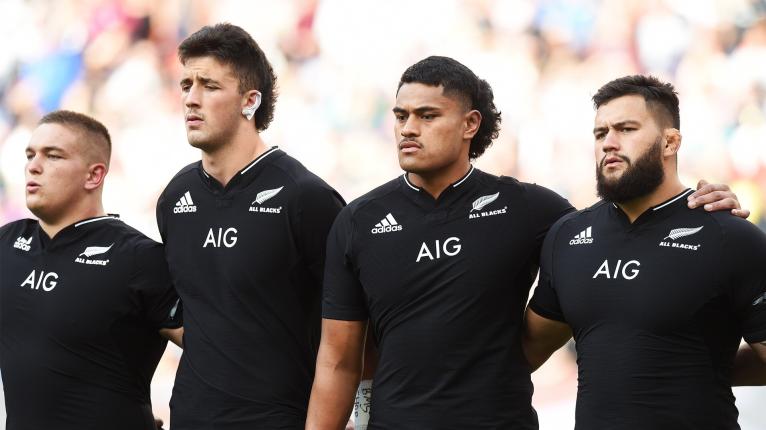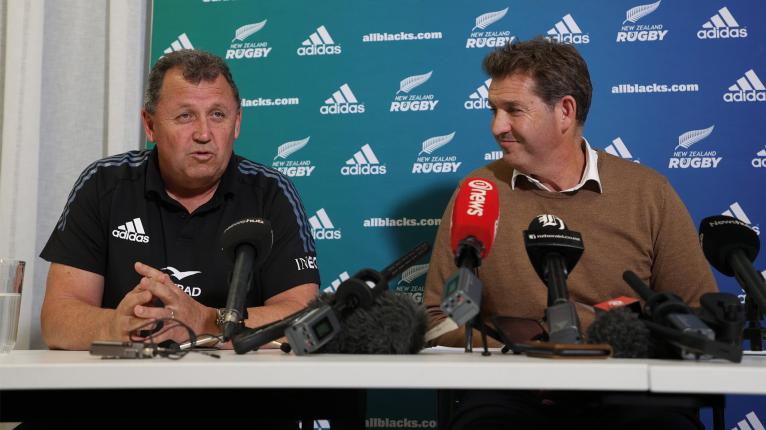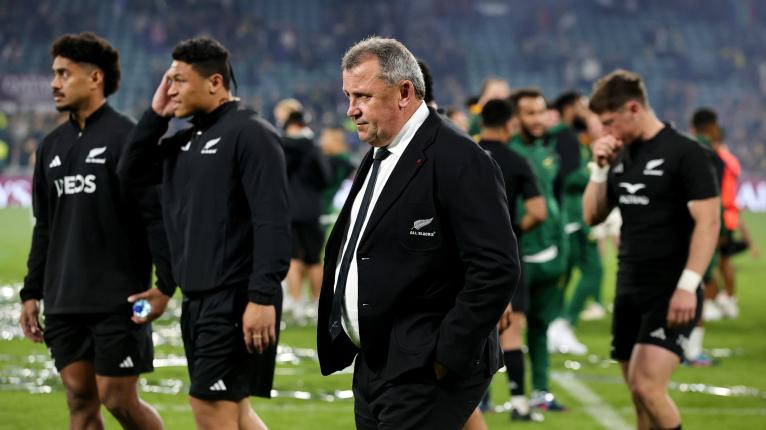It was maybe hard to see, given the exercise was about readying themselves for the present, but New Zealand’s record loss to the Springboks provided quite the insight into their longer-term future.
As was always the plan at Twickenham for the final World Cup hit-out, head coach Ian Foster emptied the bench relatively early in proceedings and for the last half hour of the game, it was the Baby Blacks who were taking on the Springboks.
If we look at who was on the park in that period, it was an All Blacks team that looked more about the next World Cup cycle, rather than this one.
At prop were two 23-year-olds in Tamaiti Williams and Fletcher Newell, with 26-year Samison Taukei’aho sandwiched between them at hooker.
At lock were 22 year-old Josh Lord and 23-year-old Tupou Vai’i. Dalton Papali’i, the 25-year-old Blues captain was in the back-row, as would have been 26-year-old Luke Jacobson had he not been taken off as a consequence of Scott Barrett’s red card.

The 22-year-old Cam Roigard won his second cap at halfback and there were two 26-year-old midfielders in Jordie Barrett and Rieko Ioane, while the 25-year-old Will Jordan started the game on the right wing with 26-year-old Mark Telea on the left.
This young group struggled to cope with the might of what was a full-noise Springboks team gearing up for their opening World Cup encounter, but let’s not forget that they also only had 14 men.
When you draw in these mitigating factors, it would have to be considered a reasonably promising and gutsy effort from a seriously young and inexperienced All Blacks team.
It was a 30-minute period that suggested the All Blacks will be well set-up for the next World Cup cycle, especially as they already know they are welcoming a new coaching team that will be headed by the enigmatic Scott Robertson.
But while the potential of the All Blacks players and coaching group is obvious, a week after the loss to the Springboks, the review into the state of New Zealand Rugby’s leadership and governance was released – and it has set alarm bells ringing.
NZR commissions an almost ridiculous number of reviews, some of which are largely ignored and some of which are partly adopted.
The review was commissioned and paid for by NZR, but it was effectively instigated by the New Zealand Rugby Players’ Association which made it a condition of returning to the negotiating table in mid-2021 when discussions about a proposed private equity deal.
But this review may be one that ends up being transformational given the context in which it was commissioned, the thoroughness of its research and strength of its findings and recommendations.
In other words, this review may prove too difficult to ignore and NZR and the provincial unions could be accused of acting with self-interest if they do.
So, first, the context. The review was commissioned and paid for by NZR, but it was effectively instigated by the New Zealand Rugby Players’ Association which made it a condition of returning to the negotiating table in mid-2021 when discussions about a proposed private equity deal with US fund manager Silver Lake broke down.
NZRPA was frustrated with both the process NZR followed to make a deal with Silver Lake and the nature of the agreement.
To NZRPA’s mind, it was a bad deal that was being pursued through bad process and it highlighted a specific and undeniable problem with the quality of executive decision-making and governance leadership within the national game.
What the players have become aware of is that they can only continue to be world-class on the field if the administration of the game in New Zealand is world class off it.

This is the reality of professional rugby now – that it is a big business with complex needs that stretch from the elite athletes down to the community game.
And in New Zealand, as is the case in Europe, there is now the additional issue of having private equity money invested in the game, which has presented a whole new level of sophistication and pressure on the commercial side.
In New Zealand the players have become acutely aware that their fate – their ability to perform and win at the highest level – is dependent on the quality of the professional club competitions in which they play and the expertise of the high-performance development programmes to which they are exposed.
And the quality of competitions and high-performance programmes are largely determined by the quality of executive leadership and governance managing them, which is why NZRPA was so determined for an independent review to ask whether New Zealand’s governance structure and process is fit for purpose.
That was the context, and these were the findings: “Private equity investors have been attracted to rugby for the opportunities they perceive to further develop the economic value of the sport.
The players have realised that the quality of executive leadership and strength of governance has a direct and meaningful impact on their ability to perform at their best.
“The money NZR has obtained from one of these investors, Silver Lake, has been readily accepted and there is no retreat from the professional era.
“But the professional game and the entry of private investors demand a matching standard of governance. The initiation of this review is explicit acknowledgement that this is not yet in place, nor the need fully recognised.
“Player power is here to stay, and a more nuanced, mutually beneficial relationship between players and administrators is needed.
“This is evident to some degree at the operational level but not yet across governance. Conflict, especially when played out in public, is diversionary and destructive.”
Essentially, the review found that the current governance set-up is not fit for purpose anymore: that the sport has evolved in the professional age and is now more of a business, with different needs and challenges.
These sorts of reviews can be dry and seemingly abstract, but the players have realised that the quality of executive leadership and strength of governance has a direct and meaningful impact on their ability to perform at their best.

High-performance sport needs money, expertise, good people and strong strategic management to succeed, and if Robertson, a young and inexperienced coach at Test level is going to succeed in nurturing the young All Blacks side that finished the test against South Africa into world champions by 2027, he’s going to need to be helped by better leadership than was afforded to his predecessor, Ian Foster.
If we look at what Foster had to deal with throughout his tenure, there is an argument to be made that he endured the worst period of leadership in NZR history.
Super Rugby was blown up and reinvented as an inferior version of itself. The attempted deal with Silver Lake put NZR at war with the players; the relationship with Rugby Australia has deteriorated to the point where there is constant divisive commentary in the media and there was a long drawn-out saga over whether the fire Foster last year and then an even more public debate that came with the failure to communicate the intention to appoint Robertson earlier this year.
These incidents have all been destabilising for the All Blacks and not helped them play at their best or feel connected to their employer.
Which is why the review has recommended that NZR needs to blow up its existing structure and appoint a board made up entirely of independent members, and to create an advisory council of relevant stakeholders.
A successful future for New Zealand rugby is unlikely without upgrading the present NZR governance framework to its 21st century context.
If it doesn’t, it faces a bleak future according to the review: one where the All Blacks may struggle to be a contender at the 2027 World Cup and beyond.
“The people who govern and manage member unions have good intentions,” stated the review. “They do not want the New Zealand rugby system to fail. Far from it.
“They are simply responding as most in their positions would, taking advantage of the prevailing governance structure which requires two-thirds of them to support constitutional change proposals.
“We do not blame them for that, but we do unequivocally state that a successful future for New Zealand rugby is unlikely without upgrading the present NZR governance framework to its 21st century context.
“In a world with competing demands—for people’s time, attention and leisure spending—other sports with modern, competency-based governance structures, and a focus on the growth and the greater good of their sport, are providing strong competition.”



If not those young players then who? Foster had no choice because we lack depth across the board. They will set us up for RWC 2027 but only if Razor can somehow conjure up a deeper squad. Good luck with that given how poorly we perform now at under 20s. And yes, this was an article of two halves.
Worst coach we ever had Rugby union to blame, feel sorry for whitelock should have been captain last 4 years, foster seems to like player's who finish second. No offense to Damien but the last thing this team needs is another chief.
Agree, foster is the problem 100 starts at the top. His track record is poor from way back. He was a first five to nice he is and it's showing in the team they are getting beaten up everywhere , mentally they are not there . They have to die for the jersey to win world cups..
The caveat to everything in a build up to a RWC is that there is an overall masterplan and plans underneath that, I.e different line ups that they want for each game, gameplans to try on different teams, pre cup and in pool games.
If you write them off after the SA and French game, you have to be certain that there's no plan, I.e direct quote from Fister, Schmidt and Ryan that there just winging it.
One needs to read the context regarding the industrial action required for a playing association to leverage their industrial relations power to change the governance of a body that is not performing adequately to run a World Class sports entity.
Lack of agreement and consultation with partners and the talent does not work out well for any sports or entertainment business.
NZR went privately to market for capital without fully investigating all their options for IPO and capital raising and have sold out the broadcasting and publishing rights to interests that have alienated the rugby punter in NZ.
Even a cursory glance at the most successful club based sports in Australasia would have shown them that putting your sport behind a paywall does not maintain the goodwill of the fans.
They alienated their supply chain of quality opposition and choked the financials of many of the participants.
A global sports brand needs international governance experience that seemingly is recognised by the player’s association but less so by NZR.
Soooooo, Foster had an eye on RWC 2027? Even though - win, draw or lose - he's out on his ear in about two months? He didn't prepare a team to make a statement against the Boks, give them a heap of confidence going into the France match and then imperiously storm home to a fine RWC victory and a fat middle finger to all who bayed for his head.
No, he blooded some youngsters and sacrificed the 2023 RWC so that Razor can have an easier run-in to the 2027 title.
I take it that insightful analysis isn't your strong point, Greg.
I must have missed it - what did the first half of this opinion piece have to do with the second? 👀 The only question that I have is why did we go into the last lead-up match before the World Cup blooding new players most of whom we have no intention of playing during the World Cup?! 😤
NZRU stuffed the ABS when they first gave the coaches job to Foster, he has tried to be another Hansen by he doesn't have the brain to achieve that. Right from the beginning of his reign he buggered around with players in then out and some back in there was no consistency with player selection and playing out of position lead to what we see now, no Montreal players uncertain of in or out the sooner the Cup is over and Razor comes in with the clean out and young players given their chance to shine the better....must admit Foster will leave with an enviable that no coach wants to have and we all know what he hasn't achieved and the losses he has achieved.